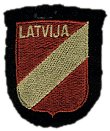21
b. Hazners' Function at Annas Street.
The respondent contends that his duties at Annas Street tied him to the office all day, every day, meaning that he could not have been outside the ghetto gate any time in September, October and November, 1941. Several witnesses testified that Hazners was at Annas Street, but none of them could agree on what he did or even how much time he spent there. For example, Meiers, who visited Annas Street once or twice a week from August, 1941 to July, 1942 (i.e. approximately 100 times) encountered Hazners there only "three or four times" during this entire period. (Meiers dep. 5, 71) Parups, on the other hand, said he saw Hazners almost every day until October, 1941. (tr. 11962) Another 1former schutzmannschaft member, Vuskalns, went so far as to claim that he arrived and departed at the same time the respondent did, seven days a week. And Sirants stated that he worked at the Annas Street headquarters on the same floor as Hazners for almost a year (August, 1941 - July, 1942) although he could not say what Hazners was doing. (Sirants dep. 103)
2Hazners characterized his duties as Chief of the Administrative Division as "in general terms ... office work." (tr. 10384) Lobe, the commander of the schutzmannschaft as of January, 1942, seemed to think that Hazners was in charge of supply and wages. (Stockholm dep. 65) But Sirants, the man who handled supply and wages at Annas Street, said that his boss was Captain Tiltins, not Captain Hazners. (Sirants dep. 96) 32/ Vilips testified that Hazners'
| 32/ | Asked whether supply and wages was the same as administrative, Sirants said: "No, different department." (Id., at p. 10) Cf. testimony of Vuskalns, who said he worked in supply in the same room as Hazners. (tr. 12167) |
Examination
We would point to the INS increasingly injecting "schutzmannschaft" in its associations with organizational guilt. This will become clear in the INS's closing of this brief.
Hāzners indicates office work; the INS then asks a witness, Lobe, whose focus was not on administration, what Hāzners did, then quotes other witnesses who state he didn't really do what Lobe stated. At no point does the INS actually delve into the nature of Hāzners's duties.
As Hāzners recounts in his memoir there was a good deal of work initially simply getting affairs in order, for example, finding translators for German edicts, orders, bilateral communications, and so on. Ongoing activities included communicating with and keeping track of the units deployed on the frontier. Although technically they were to be used for protection against infiltrators along the frontier and for and guarding strategic infrastructure, the Germans were fielding full combat units on the front by the fall of 1941, leading to arguments with their German superiors over Latvians being "baptised by fire." With Veiss' eventual departure to the front, Hāzners's duties lightened considerably. Not long thereafter he was appointed to Abrene, where it had been decided to install someone in charge with military experience to counter increasing infiltration by Soviet partisans, an assignment made all the more challenging by the border itself being completely open.
| 1 | Testimony of Janis Meiers, 1-November-1978, deposition. |
| 2 | Testimony of Eriks Parups, 10-April-1978, direct, transcript pp. 1192–1206. |
| 3 | Testimony of Valentins Sirants, 1-November-1978, deposition. |
| 4 | Testimony of Vilis A. Hazners, 8-March-1978, direct, transcript pp. 1019–1059. |
| 5 | Testimony of Karlis Lobe, 25-October-1978, deposition. |
| 6 | Testimony of Valentins Sirants, 1-November-1978, deposition. |
| 7 | Testimony of Vilhelms Vuskalns, 10-April-1978, direct, transcript pp. 1212–1218. |
